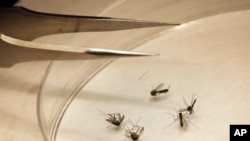Dallas, Texas, has been hard hit by West Nile Virus, a mosquito-borne disease that can cause serious neurological illness. Among the nearly 700 cases and 26 deaths nationwide, approximately half are in Texas, with Dallas, the state's third largest city, reporting 200 cases and 10 deaths.
Dallas Mayor Michael Rawlings declared a state of emergency to address the outbreak. Aerial spraying of insecticide - the first in more than 45 years - began Thursday night and will continue over the weekend and into next week.
“When you are dealing with someone’s life, that should come first and foremost,” he said.
Crews in the city had been spraying the ground for weeks, but the mayor, responding to the spread of the disease and rising death toll, decided to deploy the more aggressive tactic.
Katharyn DeVille, sickened by West Nile, backs the mayor’s decision.
“I don’t want anybody to get this! So if it means they have to go spray from the air, do it," she said.
Others aren’t so sure. At least 1,700 people in Dallas signed a petition against it and worry that the insecticide will harm them, their pets or beneficial insects like honeybees and ladybugs.
But William Reisen, a research entomologist at the University of California, Davis, expects the impact of spraying to be negligible. He points to a recent survey of hospital emergency room admissions before, during and after a spraying event.
“There didn’t seem to be any respiratory effects and nothing else that you could relate to the spray as far as changes in the admission pattern,” he said.
Source: CDC
Mosquitos pick up the virus by feeding on infected birds, and then pass it on to anyone they bite. Reisen says the insects have spread the disease so quickly this year because of the hot, dry weather in Texas.
"Heat effectively drives the virus. So hotter is better," he said. "And although mosquito populations may not be as abundant because of the lack of rain, in urban environments there are backyard swimming pools, drainage systems [that often provide good breeding grounds for mosquitos] especially during droughts, because they tend to pool and not get flushed. So you’ve got scenarios like that coming together to make the transmission cycle more effective.”
Lyle Peterson with the Centers for Disease Control and Prevention says “The jury is still out on what’s going to happen with the rest of the country.” Peterson told the New York Times, while more cases are expected, “This looks like a regional event.”
Dallas Mayor Michael Rawlings declared a state of emergency to address the outbreak. Aerial spraying of insecticide - the first in more than 45 years - began Thursday night and will continue over the weekend and into next week.
“When you are dealing with someone’s life, that should come first and foremost,” he said.
Crews in the city had been spraying the ground for weeks, but the mayor, responding to the spread of the disease and rising death toll, decided to deploy the more aggressive tactic.
Katharyn DeVille, sickened by West Nile, backs the mayor’s decision.
“I don’t want anybody to get this! So if it means they have to go spray from the air, do it," she said.
Others aren’t so sure. At least 1,700 people in Dallas signed a petition against it and worry that the insecticide will harm them, their pets or beneficial insects like honeybees and ladybugs.
But William Reisen, a research entomologist at the University of California, Davis, expects the impact of spraying to be negligible. He points to a recent survey of hospital emergency room admissions before, during and after a spraying event.
“There didn’t seem to be any respiratory effects and nothing else that you could relate to the spray as far as changes in the admission pattern,” he said.
West Nile Virus
West Nile Virus- Most often spread by the bite of an infected mosquito
- Mosquitoes become infected by feeding on infected birds
- One in 150 infected people develop severe symptoms such as stupor, muscle weakness, vision loss, numbness and paralysis
- 80 percent of people infected have no symptoms
- There is no specific treatment, but in severe cases hospitalization can be required
- Can be prevented by community-based mosquito control programs
Source: CDC
"Heat effectively drives the virus. So hotter is better," he said. "And although mosquito populations may not be as abundant because of the lack of rain, in urban environments there are backyard swimming pools, drainage systems [that often provide good breeding grounds for mosquitos] especially during droughts, because they tend to pool and not get flushed. So you’ve got scenarios like that coming together to make the transmission cycle more effective.”
Lyle Peterson with the Centers for Disease Control and Prevention says “The jury is still out on what’s going to happen with the rest of the country.” Peterson told the New York Times, while more cases are expected, “This looks like a regional event.”





